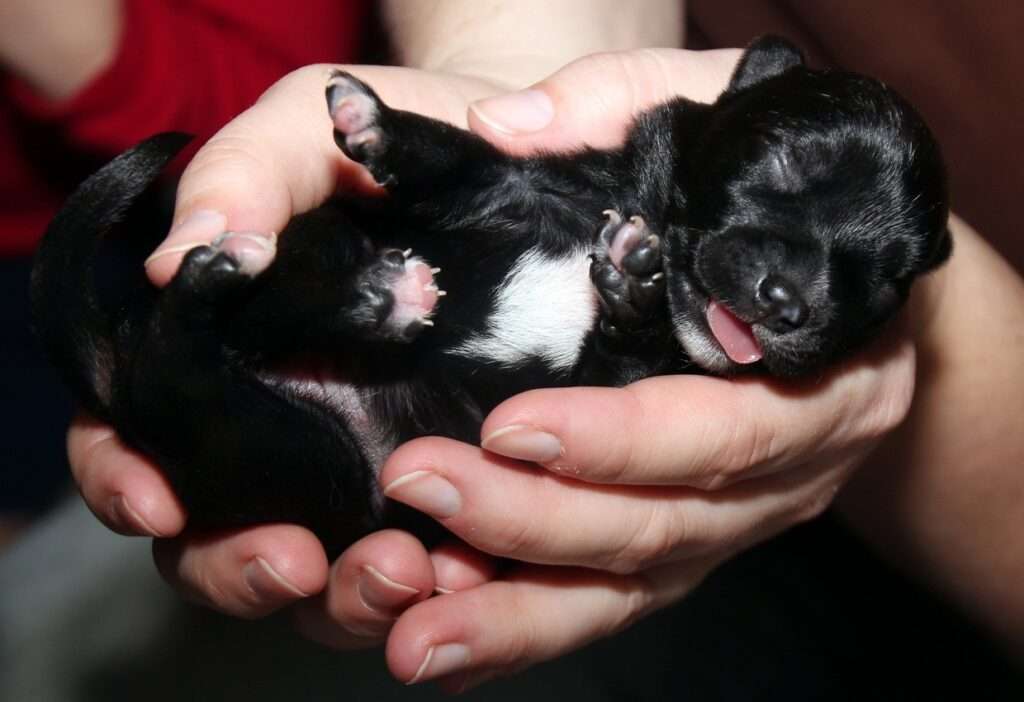Expert Answers: How Long Can You Leave Newborn Puppies Unattended?
Welcome to BarkLikeMeow’s comprehensive guide on the topic of “How Long Can You Leave Newborn Puppies Unattended.” Newborn puppies are undeniably adorable, but they also require attentive care and guidance during their early stages of life. In this article, we’ll delve into the critical aspects of caring for newborn puppies and address the crucial question of how long they can be left unattended.
Understanding Newborn Puppies
Developmental Stages
Just like human infants, newborn puppies go through several developmental stages, each with its unique needs and characteristics:
- Neonatal Stage (0-2 Weeks): This is the initial stage when puppies are most vulnerable. They are born blind, deaf, and completely dependent on their mother for sustenance and warmth. During this period, their primary activities involve nursing and sleeping.
- Transitional Stage (2-4 Weeks): Puppies start to open their eyes and ears, gradually becoming more aware of their surroundings. They also begin to explore and interact with their littermates. While they still rely heavily on their mother for nutrition, they start to show signs of independence.
- Socialization Stage (4-12 Weeks): This is the phase when puppies become more active, curious, and ready to learn about the world. Socialization becomes crucial during this period, as puppies begin to adapt to various experiences and personalities.
Basic Needs of Newborn Puppies
To ensure the health and well-being of newborn puppies, it’s essential to meet their basic needs:
- Nutrition: Mother’s milk is the most critical source of nourishment during the neonatal stage. It provides essential nutrients and antibodies crucial for their growth. As puppies transition to solid food, a suitable puppy diet should be introduced under the guidance of a veterinarian.
- Hygiene: Puppies cannot eliminate waste on their own during the neonatal stage. Mother dogs typically stimulate elimination by licking them. You’ll need to mimic this by gently massaging the puppy’s anal and genital area with a warm, damp cloth.
- Warmth: Newborn puppies are unable to regulate their body temperature effectively, so they need a warm and cozy environment. The ideal temperature for the neonatal stage is around 85-90°F (29-32°C). Heating pads or heat lamps can help maintain the proper temperature.
- Stimulation: Puppies require physical and mental stimulation, even from a very young age. This can be achieved through gentle handling and interactions that encourage their growth and development.
Understanding these crucial elements of newborn puppy care sets the foundation for responsible pet ownership. In the following sections, we will explore the factors that influence how long you can safely leave newborn puppies unattended and provide guidance for their care at every stage of development.
Factors Influencing How Long Can You Leave Newborn Puppies Unattended
When it comes to leaving newborn puppies unattended, several factors play a pivotal role in determining what’s safe and responsible. Understanding these factors is crucial for ensuring the well-being of your tiny, furry companions:
- Age of Puppies: The age of the puppies is a key factor in determining how long they can be left unattended. As mentioned earlier, newborn puppies go through distinct developmental stages, and their needs evolve rapidly. The younger the puppies, the more critical it is to provide continuous care and supervision.
- Mother’s Presence: The presence of the mother dog, or dam, is of paramount importance. She is the primary caregiver, providing not only nourishment but also vital warmth and comfort. Her presence also helps in teaching important social and behavioral lessons to the puppies.
- Health and Special Needs: Puppies with health issues or special needs may require more frequent attention and care. Some newborn puppies may have congenital conditions or medical concerns that necessitate constant monitoring and assistance. Always consult with a veterinarian for guidance on caring for these special cases.
- Litter Size: The size of the puppy litter is another factor to consider. Larger litters typically demand more attention and care, as the mother might not be able to provide adequate nourishment and warmth to all the puppies simultaneously.
- Environment and Safety Measures: Creating a safe environment for the puppies is essential. Ensure that their living space is free from hazards, such as cords, small objects, or any items that could be ingested. Temperature control is also vital, as newborn puppies cannot regulate their body temperature.
Caring for Newborn Puppies When You Must Be Away

We understand that there may be times when you need to step away or attend to your daily responsibilities. It’s crucial to have a plan in place to ensure the safety and well-being of the puppies, even when you can’t be present.
- Preparing a Safe Space: Designate a secure area for the puppies that is free from potential dangers. This space should be comfortable, warm, and easily sanitized. Puppy playpens or whelping boxes can help create a safe and contained environment.
- Finding a Trusted Caregiver: If you must leave your newborn puppies, find a trustworthy caregiver who can step in during your absence. This could be a family member, friend, or a professional pet sitter with experience in puppy care. Make sure they are well-informed about the puppies’ specific needs and routines.
- Puppy Monitoring Tools: Technology has made it easier than ever to keep an eye on your puppies remotely. Consider using puppy monitoring cameras or apps to check in on them while you’re away. This can provide peace of mind and help ensure the puppies are safe and comfortable.
- Scheduled Feeding and Toileting: Establish a feeding and toileting schedule for the puppies. This helps maintain consistency and ensures they receive the nutrition and care they require. Your caregiver should be familiar with this routine and follow it closely.
- Appropriate Toys and Enrichment: Even when you’re not present, it’s important to provide appropriate toys and enrichment for the puppies. These can keep them engaged and stimulated, preventing boredom and encouraging healthy development.
In the following sections, we’ll dive deeper into guidelines for leaving newborn puppies unattended and explore the potential risks associated with prolonged absences. Stay tuned to make sure you’re equipped with all the information you need to be a responsible and loving puppy parent.
How Long is Too Long? Guidelines for Leaving Newborn Puppies Unattended
Determining how long you can leave newborn puppies unattended is a critical aspect of responsible puppy care. While it’s impossible to provide a one-size-fits-all answer, we can offer some guidelines based on the developmental stages of puppies:
- The Neonatal Stage: During the neonatal stage, which encompasses the first two weeks of a puppy’s life, they are incredibly fragile and wholly reliant on their mother for nourishment and warmth. Leaving them unattended for extended periods should be avoided whenever possible. Short breaks may be necessary, but ideally, there should be someone available to watch over them constantly.
- The Transitional Stage: As puppies enter the transitional stage (2-4 weeks), they become more aware of their surroundings and can start to explore and interact with littermates. While they still depend on their mother for nutrition, short periods of separation may be acceptable as long as the dam is present. Keep these breaks brief and within your puppy’s comfort zone.
- The Socialization Stage: From 4 to 12 weeks, puppies enter the socialization stage, where they become more active and curious. They begin to learn about the world around them. During this period, you can gradually increase the time they spend away from their mother and littermates. However, ensure that they are in a safe and secure environment and have access to proper nourishment and care.
Remember that each puppy is unique, and their individual needs may vary. Always pay close attention to their cues, and consult with a veterinarian or breeder for specific guidance regarding your puppies’ development and well-being.
Risks of Leaving Newborn Puppies Unattended

While it may be necessary to leave newborn puppies unattended for short periods under certain circumstances, it’s essential to be aware of the potential risks involved:
- Health Complications: Leaving puppies unattended for extended periods, especially during the neonatal stage, can lead to health issues. Insufficient feeding and care can result in dehydration, hypoglycemia, and even fading puppy syndrome, a severe and sometimes fatal condition.
- Behavioral Issues: Puppies that experience prolonged isolation or a lack of socialization during critical developmental stages may develop behavioral problems later in life. These can include anxiety, fear, aggression, and difficulty adjusting to new environments or people.
- Fading Puppy Syndrome: Fading puppy syndrome is a term used to describe a range of illnesses or conditions that can afflict newborn puppies. Puppies that are left unattended for extended periods may be at higher risk of experiencing these health problems, which can be life-threatening.
To minimize these risks, it’s crucial to provide constant care and attention to newborn puppies, especially during the neonatal stage. If you ever find it necessary to leave them unattended, ensure that they are in a secure and monitored environment.
Case Studies and Expert Opinions
In this section, we’ll dive into real-life scenarios and gather insights from veterinarians, breeders, and experienced puppy owners to shed light on how to navigate the complexities of leaving newborn puppies unattended.
Real-Life Scenarios
- Scenario 1 – The Working Puppy Parent: Jane, a working professional, found herself juggling her job and caring for her litter of puppies. To ensure their well-being, she arranged her work-from-home schedule, allowing her to supervise the puppies closely during the early stages. She also enlisted the help of a trusted neighbor, who would check on the puppies during her short absences for meetings.
- Scenario 2 – The Frequent Traveler: Mark had to travel frequently for his job, which raised concerns about his ability to care for his newborn puppies. He sought advice from a local breeder who recommended a combination of installing puppy cameras and hiring a professional pet sitter experienced with puppies. This allowed Mark to monitor and ensure the puppies’ care from a distance.
Veterinarian and Breeder Recommendations
- Expert Advice from Dr. Smith: Dr. Smith, a local veterinarian, emphasized the importance of constant care during the neonatal stage and recommended using heating pads to maintain an optimal temperature. She also stressed the significance of regular vet check-ups to monitor the puppies’ health and development.
- Breeder Insights from Sarah: Sarah, an experienced breeder, shared her knowledge about early socialization. She highlighted that, during the transitional stage, while it’s acceptable to have short separations, it’s crucial for the dam to be present. Sarah encouraged new puppy owners to follow a structured socialization program to ensure well-adjusted adult dogs.
These examples and expert insights provide practical guidance on how puppy owners have successfully navigated the challenges of leaving newborn puppies unattended while ensuring their well-being and development. It’s important to adapt these strategies to your unique circumstances and consult with professionals to make the best decisions for your puppies.
Tips for Balancing Puppy Care and Life Obligations

Balancing the responsibilities of puppy care with your daily life can be challenging, but it’s achievable with careful planning and support. Here are some practical tips to help you find that balance:
- Coordinating with Family and Friends: Reach out to your family and friends for assistance in puppy care. Sharing the responsibility with loved ones can provide the puppies with the care they need while allowing you some flexibility in your schedule.
- Work Schedules and Puppy Care: If you have a full-time job, consider adjusting your work schedule to accommodate your puppy’s needs. This might include breaks to feed and check on them, or working from home if possible.
- Hiring Professional Help: Professional pet sitters or dog walkers can be a great resource when you need to be away. Ensure that they are experienced with newborn puppies and understand their unique requirements.
Finding the right balance between your life obligations and puppy care is essential for both your well-being and that of your furry companions. By implementing these tips and seeking assistance when needed, you can provide your puppies with the care and attention they require, even when your daily schedule demands your time and energy.
Training and Socialization for Newborn Puppies
Training and socialization are pivotal aspects of nurturing well-rounded and well-behaved puppies. While training begins in earnest around 4-6 weeks, socialization is a continuous process that starts the moment they open their eyes:
- Early Training Techniques: Introduce basic training concepts early on, teaching puppies simple commands like “sit” and “stay.” Keep these sessions short and engaging, as newborn puppies have short attention spans. Positive reinforcement, using treats and praise, is highly effective.
- Socialization Importance: Socialization is a vital part of a puppy’s development. It’s during this phase that they learn to interact with other animals, people, and various environments. Exposure to different sights, sounds, and experiences helps puppies become well-adjusted, confident adults.
- Professional Training Services: Consider enrolling your puppies in a puppy socialization class or hiring a professional trainer. These services provide structured training and socialization experiences under the guidance of experts who understand the unique needs of puppies.
Preparing for the Future: Gradual Independence

As your puppies grow, it’s essential to prepare them for gradual independence. Here’s how you can ease the transition to more autonomy:
- Weaning Process: Around 3-4 weeks, puppies can begin the weaning process, transitioning from mother’s milk to solid food. This marks the start of their self-sufficiency. Monitor their progress and adjust their diet as needed.
- Puppy-Proofing Your Home: As puppies become more active and curious, ensure your home is puppy-proofed. Remove hazards, secure electrical cords, and keep toxic substances out of reach. This creates a safe environment for them to explore.
- Transitioning to Alone Time: Gradually increase the time your puppies spend alone. Start with short intervals and build up as they become more independent. Provide them with toys and activities to keep them engaged during these periods.
By focusing on training and socialization and facilitating a smooth transition to independence, you’re setting the stage for confident, well-behaved adult dogs. Remember that every puppy is unique, and your patience and understanding during this process will contribute to their long-term well-being.
Conclusion
In closing, our comprehensive guide on “How Long Can You Leave Newborn Puppies Unattended” has provided you with a wealth of information and insights into the care of these precious and vulnerable young animals. Caring for newborn puppies is a rewarding but challenging endeavor, one that requires dedication, patience, and a deep commitment to their well-being.
Throughout this guide, we’ve explored the developmental stages of newborn puppies, the factors that influence their ability to be left unattended, and the risks associated with prolonged separation. We’ve offered real-life case studies, expert opinions, and practical tips to help you navigate the delicate balance between caring for your puppies and managing your daily life.
We’ve stressed the importance of training, socialization, and preparing your puppies for gradual independence, all of which are essential steps in ensuring they grow into well-adjusted, happy adult dogs.
Frequently Asked Questions
Can I leave newborn puppies alone for a few minutes while I run errands or take a shower?
During the neonatal stage (0-2 weeks), it’s best to avoid leaving newborn puppies alone for extended periods. However, if you need a few minutes for quick tasks, it can be acceptable as long as you ensure the puppies are in a safe, warm environment, and their mother is present. Always keep these breaks brief.
Is it safe to use puppy monitoring cameras when I need to leave the house briefly?
Yes, puppy monitoring cameras can be a valuable tool to check on your puppies when you’re not at home. They offer real-time video and audio feeds, allowing you to keep an eye on your puppies’ well-being remotely.
How long can I leave newborn puppies unattended during the transitional stage (2-4 weeks)?
While puppies in the transitional stage are becoming more independent, it’s still crucial for their mother to be present for their nutritional and emotional needs. Short periods of separation for quick tasks are generally acceptable, but always prioritize their comfort and safety.
When is it safe to start leaving puppies unattended for longer periods?
As puppies progress through the socialization stage (4-12 weeks), they become more self-sufficient. You can gradually increase the time they spend alone, starting with short intervals and extending as they become more comfortable. However, always ensure they have access to food, water, and a secure environment.
What should I do if I have to be away from my puppies for an extended period of time?
If you must be away from your puppies for an extended period, ensure that you have a trusted caregiver or pet sitter who understands their needs. This caregiver should follow your feeding, toileting, and safety routines. Using a puppy monitoring camera can also provide added peace of mind.
Are there any signs that my puppies are not comfortable with being left alone?
Watch for signs of distress in your puppies, such as excessive whining, restlessness, or soiling their sleeping area. These can be indicators that they are uncomfortable with being left alone. Gradual transitions and providing appropriate toys and comfort items can help ease their anxiety.
How can I prepare my puppies for being alone when they are older?
Gradual independence is key. Start by increasing their alone time, providing toys and activities to keep them engaged. Ensure that your home is puppy-proofed, so they can safely explore. Professional training and socialization can also help prepare them for life as independent, well-adjusted dogs.
Is it safe to introduce solid food during the transitional stage, and can I leave them alone while they eat?
It is safe to introduce solid food to puppies during the transitional stage. However, it’s advisable to supervise their feeding initially to ensure they are eating properly. While they eat, it’s best to be present to monitor their progress and ensure they don’t choke.
How can I balance the care of newborn puppies with my work schedule and other daily obligations?
Balancing work and puppy care can be challenging. Consider adjusting your work schedule, working from home when possible, or seeking assistance from family members, friends, or professional pet sitters to ensure your puppies receive the care and attention they need.
What are the potential long-term effects of not providing adequate care and supervision for newborn puppies?
Failing to provide proper care and supervision for newborn puppies can result in long-term health and behavioral issues. This may include anxiety, aggression, and difficulty adapting to new situations. Socialization and early training are crucial to prevent such problems and raise well-adjusted adult dogs.




